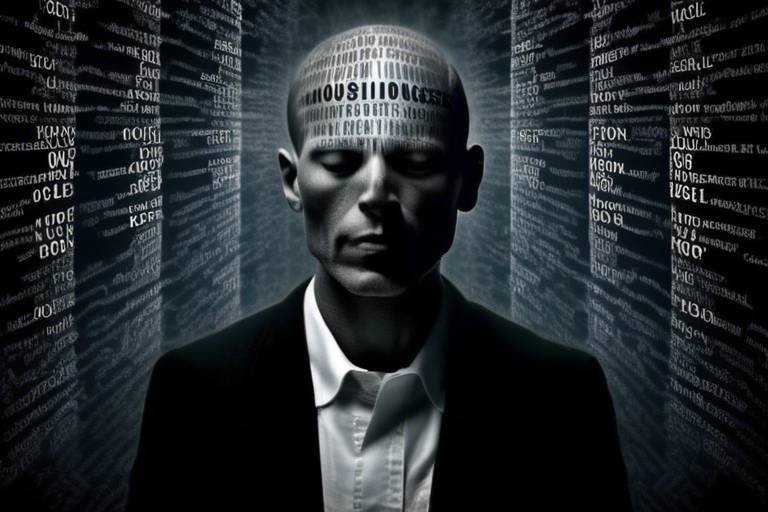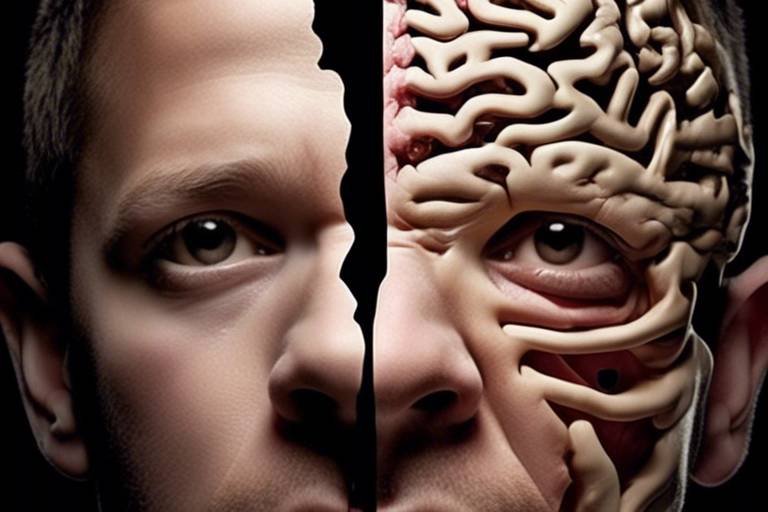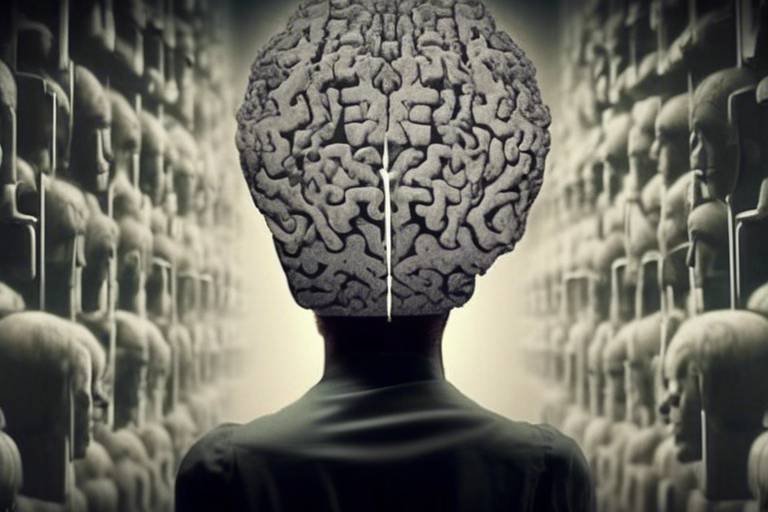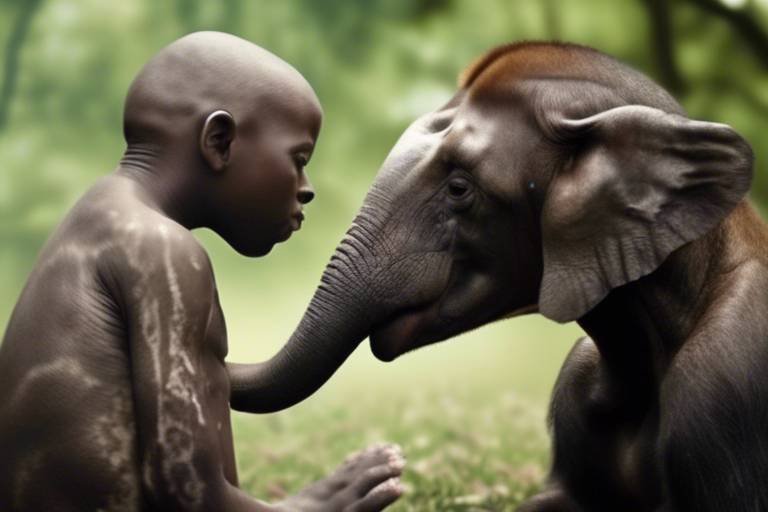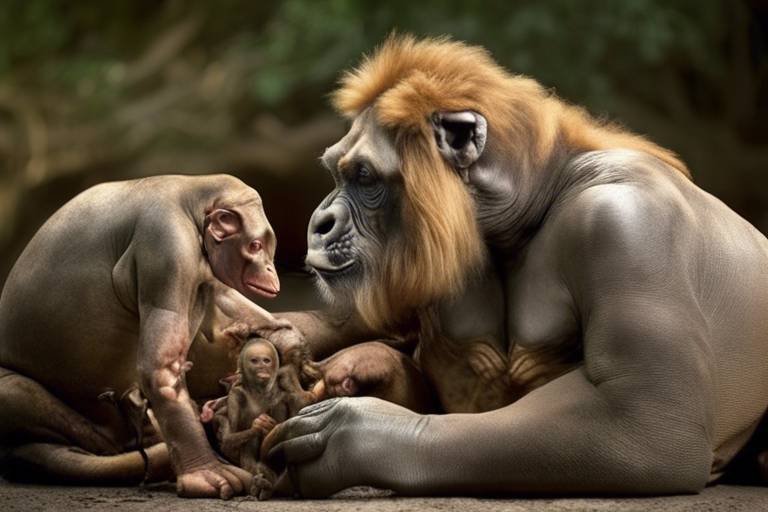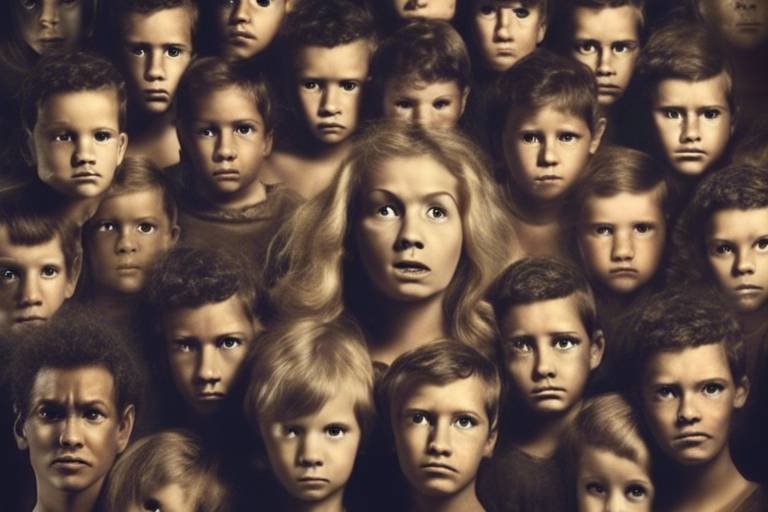The Effect of Conscience on Consciousness
Have you ever wondered how that little voice inside your head influences your thoughts and actions? This is the essence of conscience and its profound effect on our consciousness. Our conscience acts as a moral compass, guiding us through the complexities of life, while our consciousness serves as the stage where our thoughts, feelings, and actions play out. Together, they create a dynamic interplay that shapes not only our individual experiences but also our interactions with the world around us.
In this article, we will explore how our conscience shapes our consciousness, influencing everything from our emotions to our decision-making processes. By understanding this relationship, we can gain valuable insights into human psychology and the ethical frameworks that govern our behavior. So, let’s dive deeper into the fascinating world of conscience and consciousness!
To fully grasp the effect of conscience on consciousness, we must first understand what conscience really is. At its core, conscience is our inner sense of right and wrong, a moral guide that informs our decisions and actions. It is shaped by various factors, including upbringing, culture, and personal experiences. Think of it as a finely tuned instrument that resonates with our moral beliefs.
Conscience plays several key roles in our lives:
- Decision-Making: It helps us evaluate choices based on our moral values.
- Self-Regulation: Conscience encourages us to adhere to societal norms and personal ethics.
- Emotional Feedback: It triggers feelings like guilt or pride, guiding our future actions.
Understanding the origins and functions of conscience is essential for recognizing its profound impact on our consciousness. When we make decisions, our conscience acts as a filter, allowing us to reflect on our moral beliefs and how they align with our actions.
Now that we have a grasp on conscience, let’s explore consciousness itself. Consciousness can be thought of as the backdrop of our mental theater, where all our thoughts, feelings, and perceptions unfold. It encompasses various layers, from basic awareness of our surroundings to deeper self-reflection.
Consciousness plays a critical role in self-awareness, allowing us to recognize our thoughts and feelings as separate from the external world. This self-awareness is essential for personal growth and ethical living. Imagine consciousness as a canvas, where every brushstroke represents a thought, emotion, or experience. The more we engage with our consciousness, the richer our canvas becomes.
The relationship between conscience and consciousness is intricate and fascinating. Our conscience not only informs our moral judgments but also shapes our perceptions of reality. When we face ethical dilemmas, our conscience acts as a guide, influencing how we interpret situations and respond to them.
Consider this: when someone behaves unethically, their conscience may trigger feelings of guilt, which in turn affects their consciousness. This emotional response can lead to a heightened awareness of their actions and a desire to make amends. Thus, conscience and consciousness are interwoven, creating a feedback loop that influences our behavior.
Moral development is another crucial factor that affects our conscious awareness. As we grow and evolve, our understanding of right and wrong becomes more nuanced. Various theories of moral reasoning, such as Kohlberg's stages of moral development, illustrate how our moral compass shifts over time.
These stages highlight the importance of social interactions and cognitive development in shaping our moral awareness. For instance, children may initially rely on external rules, but as they mature, they develop a deeper understanding of empathy and justice. This evolution impacts their consciousness, allowing them to navigate complex moral landscapes with greater ease.
Our conscience is deeply intertwined with our emotional responses. Emotions like guilt, shame, and empathy are often triggered by our moral awareness. When we act against our conscience, we may experience guilt, which serves as an emotional signal that something is amiss.
This emotional landscape is essential for moral actions, as it encourages us to consider the impact of our choices on others. By understanding how our conscience shapes our emotional responses, we can foster a more compassionate and ethical society.
Finally, let’s examine how conscience affects our behavior in practical terms. A well-developed conscience can lead to more ethical decision-making and positive social interactions. When we are aware of our moral beliefs, we are more likely to act in ways that align with those values.
In everyday life, this means:
- Making choices that reflect our values, even when it’s difficult.
- Engaging in community service or helping others as a reflection of our moral beliefs.
- Building trust in relationships through honesty and integrity.
In conclusion, the interplay between conscience and consciousness is a powerful force that shapes our thoughts, emotions, and behaviors. By understanding this relationship, we can cultivate a more ethical and self-aware existence.
As we explore the effect of conscience on consciousness, it's important to recognize that cultural factors significantly influence how we interpret and prioritize our moral compass. Different cultures have distinct beliefs and practices that shape their understanding of conscience and ethical behavior.
For instance, in collectivist societies, the emphasis may be on community well-being, while individualistic cultures might prioritize personal freedom and autonomy. These cultural differences highlight the diverse ways in which conscience manifests in consciousness across the globe.
- What is the difference between conscience and consciousness?
Conscience refers to our moral sense of right and wrong, while consciousness is the awareness of our thoughts and feelings. - How does conscience influence decision-making?
Conscience serves as a moral guide, helping us evaluate choices based on our ethical beliefs. - Can conscience change over time?
Yes, conscience can evolve as we gain new experiences and insights, particularly through moral development. - What role do emotions play in conscience?
Emotions like guilt and empathy are closely linked to our conscience, influencing our moral actions and decisions.

The Nature of Conscience
Understanding the nature of conscience is crucial for grasping how it influences human behavior. Conscience can be described as the internal compass that guides our moral decisions, helping us distinguish between right and wrong. It’s that little voice inside our heads that whispers when we’re about to stray from our ethical path. But where does this voice come from? It’s a fascinating blend of our upbringing, societal norms, and personal experiences. Think of it as a unique recipe that combines ingredients from our family, culture, and individual reflections.
The origins of conscience can be traced back to various factors, including biological, psychological, and social influences. Biologically, our brains are wired to process moral dilemmas, and certain areas are activated when we contemplate ethical issues. Psychologically, our conscience evolves as we grow, shaped by our experiences and the lessons we learn along the way. Socially, the norms and values of the communities we belong to play a significant role in molding our moral compass.
One of the most intriguing aspects of conscience is its function in decision-making processes. When faced with a moral dilemma, our conscience serves as a guide, influencing our choices and actions. It often manifests as feelings of guilt or pride, depending on whether we adhere to or violate our moral beliefs. For instance, if you help someone in need, your conscience might fill you with a sense of satisfaction. Conversely, if you betray a friend, you may experience guilt that lingers long after the act. This emotional feedback loop reinforces our understanding of right and wrong, shaping our future behaviors.
To illustrate the functions of conscience, consider the following table that summarizes its key roles:
| Function | Description |
|---|---|
| Guidance | Helps individuals navigate moral dilemmas by providing a sense of right and wrong. |
| Emotional Feedback | Generates feelings of guilt or pride based on moral actions, reinforcing ethical behavior. |
| Social Cohesion | Encourages behaviors that promote societal values and norms, fostering community trust. |
Moreover, the manifestation of conscience varies from person to person. Some may have a highly developed conscience that prompts them to consider the consequences of their actions deeply, while others may struggle with moral ambiguity. This variability can lead to interesting discussions about personal integrity and ethical behavior. How do we reconcile differences in conscience when interacting with others? It’s a complex dance that requires empathy and understanding.
In summary, the nature of conscience is a multifaceted concept that plays a pivotal role in our moral decision-making. It is shaped by a combination of biological, psychological, and social factors, and it serves as a crucial guide in our interactions with the world. As we navigate life’s challenges, our conscience helps us reflect on our values and the impact of our choices, ultimately shaping who we are as individuals.
- What is conscience? Conscience is the internal sense of right and wrong that guides our moral decisions.
- How does conscience develop? It develops through a combination of biological, psychological, and social influences.
- Can conscience change over time? Yes, it can evolve based on experiences, education, and societal changes.
- Why is conscience important? It helps us make ethical decisions and fosters social cohesion by encouraging behaviors that align with community values.

The Role of Consciousness
Consciousness is a fascinating and complex phenomenon that serves as the foundation for our thoughts, feelings, and experiences. It is the lens through which we perceive the world and ourselves, acting as a stage where our mental processes unfold. Imagine consciousness as a vast ocean, with waves representing our thoughts and emotions constantly rising and falling. It is this ocean that shapes our reality, influencing how we interact with the world around us.
To understand the role of consciousness, we must first recognize its layers. At the surface, we have our immediate awareness—what we are currently thinking about or feeling. However, just beneath that surface lies a deeper level of consciousness that encompasses our memories, beliefs, and values. This deeper layer acts like an undercurrent, subtly guiding our thoughts and actions without us even realizing it. It’s like a hidden river that flows beneath the surface of a lake, shaping the landscape in ways that aren’t immediately visible.
Moreover, consciousness plays a critical role in self-awareness. It allows us to reflect on our thoughts and feelings, enabling us to ask ourselves profound questions such as, “Who am I?” or “What do I truly value?” This reflective capacity is what sets humans apart from other species; it grants us the ability to contemplate our existence and make choices that align with our values. For instance, when faced with a moral dilemma, our consciousness helps us weigh our options, considering not just the immediate consequences but also the broader implications of our actions.
One of the most intriguing aspects of consciousness is its relationship with perception. Our consciousness acts as a filter, determining what we focus on and how we interpret our experiences. This filtering process can be influenced by various factors, including our cultural background, personal experiences, and even our emotional state at the moment. For example, two individuals witnessing the same event may interpret it entirely differently based on their unique perspectives, shaped by their own consciousness.
In addition to perception, consciousness is also integral to our emotional experiences. It allows us to recognize and process our feelings, which is essential for emotional regulation and mental well-being. When we become aware of our emotions, we can respond to them more effectively, rather than simply reacting impulsively. This self-awareness fosters emotional intelligence, enabling us to navigate our social environments with greater empathy and understanding.
As we delve deeper into the concept of consciousness, it becomes clear that it is not just a passive state of being; it is an active process that shapes our reality. It influences our decision-making, guides our moral judgments, and ultimately plays a significant role in our overall life experience. Understanding the intricacies of consciousness can empower us to take control of our thoughts and actions, fostering a more intentional and fulfilling life.
- What is consciousness? Consciousness refers to the state of being aware of and able to think about one’s own existence, thoughts, and surroundings.
- How does consciousness influence behavior? Consciousness shapes our perceptions and decisions, guiding our actions based on our awareness of ourselves and our environment.
- Can consciousness be altered? Yes, consciousness can be altered through various means such as meditation, psychoactive substances, and even certain mental health conditions.
- What is the relationship between consciousness and emotions? Consciousness allows us to recognize and process our emotions, which is crucial for emotional regulation and mental well-being.

The Relationship Between Conscience and Consciousness
When we think about the intricate dance between conscience and consciousness, it’s akin to watching two skilled performers twirl around each other on a stage, each influencing the other’s movements. Our conscience, that inner voice guiding our moral compass, plays a pivotal role in shaping our consciousness, which is the backdrop for all our thoughts and feelings. But how exactly does this relationship unfold? Let’s break it down.
At its core, conscience acts as a filter through which our consciousness processes experiences. Imagine you’re faced with a decision that could impact someone else’s life. Your conscience kicks in, prompting you to weigh the ethical implications of your choices. This moment of reflection is where your consciousness becomes aware of moral considerations. It’s a bit like turning on a light in a dark room; suddenly, you can see the potential consequences of your actions more clearly.
Moreover, the interplay between these two elements is crucial for our ethical behavior. When our conscience is well-developed, it enhances our conscious awareness, allowing us to make decisions that align with our values. For instance, consider a scenario where you witness someone being treated unfairly. Your conscience may evoke feelings of empathy and a desire to intervene. This emotional response is not just a fleeting thought; it transforms your consciousness, compelling you to act in a way that reflects your moral beliefs.
Interestingly, this relationship also underscores the significance of moral judgments. Our conscience informs our perceptions of right and wrong, which, in turn, shapes our conscious thoughts. When we encounter moral dilemmas, our conscience serves as an internal guide, helping us navigate the complexities of human interactions. This can be illustrated in a table that outlines the key influences of conscience on consciousness:
| Influence of Conscience | Impact on Consciousness |
|---|---|
| Ethical Awareness | Heightened perception of moral implications |
| Emotional Responses | Increased empathy and guilt |
| Decision-Making | More thoughtful and reflective choices |
| Social Interactions | Enhanced understanding of others' feelings |
As we delve deeper into this relationship, it becomes clear that a well-tuned conscience enriches our conscious experience, leading to a more profound understanding of ourselves and the world around us. It’s as if our conscience acts as a lens, focusing our consciousness on what truly matters. This heightened state of awareness not only influences our personal integrity but also enhances our capacity for compassion, fostering a more connected and empathetic society.
In conclusion, the relationship between conscience and consciousness is a dynamic and essential aspect of human psychology. By recognizing how our moral awareness shapes our conscious experience, we can better understand our motivations and behaviors. Ultimately, this awareness empowers us to lead lives that are not only fulfilling but also aligned with our deepest values and ethical principles.
- What is the difference between conscience and consciousness?
Conscience refers to our inner moral compass that guides our sense of right and wrong, while consciousness is the state of being aware of our thoughts, feelings, and surroundings.
- How does conscience affect decision-making?
A well-developed conscience influences our decision-making by prompting us to consider the ethical implications of our choices, leading to more thoughtful and responsible actions.
- Can conscience change over time?
Yes, conscience can evolve based on personal experiences, education, and cultural influences, leading to shifts in our moral beliefs and values.

Moral Development and Awareness
Moral development is a fascinating journey that shapes our understanding of right and wrong, influencing our conscience and, consequently, our consciousness. It’s like a roadmap guiding us through the intricate maze of ethical dilemmas we encounter daily. From childhood to adulthood, our moral compass evolves, influenced by a multitude of factors including family upbringing, cultural norms, and personal experiences. This development doesn't just happen overnight; it’s a gradual process that unfolds over time, much like a flower blooming in stages.
At the heart of moral development are several key theories that help us understand how individuals reason about morality. One of the most notable is Lawrence Kohlberg's stages of moral development. Kohlberg proposed that moral reasoning progresses through three main levels: pre-conventional, conventional, and post-conventional. Each level encompasses two stages, which illustrate how our understanding of morality becomes more complex as we grow. For instance, in the pre-conventional stage, a child’s moral reasoning is primarily based on the consequences of actions—essentially, the classic "good or bad" mentality. However, as they mature into the conventional stage, they start to consider societal norms and rules, reflecting a deeper awareness of how their actions affect others.
| Level | Stage | Description |
|---|---|---|
| Pre-Conventional | 1 | Obedience and Punishment Orientation |
| Pre-Conventional | 2 | Self-Interest Orientation |
| Conventional | 3 | Interpersonal Accord and Conformity |
| Conventional | 4 | Authority and Social Order Maintaining Orientation |
| Post-Conventional | 5 | Social Contract Orientation |
| Post-Conventional | 6 | Universal Ethical Principles |
This moral framework is crucial because it highlights that our understanding of morality is not static; it can evolve as we gain new insights and experiences. For instance, a teenager may initially view rules as absolute, but as they engage with diverse perspectives and experiences, they might begin to question those rules, leading to a more nuanced understanding of justice and fairness. This shift is where awareness plays a pivotal role. The more aware we are of our own values and the moral implications of our actions, the more refined our conscience becomes.
Moreover, moral development is not just an individual journey; it’s deeply intertwined with social interactions. Engaging in discussions about ethical issues, participating in community service, or even facing moral challenges can significantly enhance our moral reasoning. These experiences act like mirrors, reflecting our values and beliefs, and prompting us to reconsider our positions. It’s a beautiful cycle of growth where our conscience informs our consciousness, and our consciousness, in turn, enriches our moral development.
Ultimately, understanding moral development and awareness is essential for fostering a more empathetic and ethically aware society. When individuals recognize the complexity of moral reasoning, they are better equipped to navigate the challenges of life with integrity and compassion. As we continue to explore the depths of our conscience and consciousness, we pave the way for a more harmonious existence, where moral awareness becomes a cornerstone of our interactions.
- What is moral development? Moral development refers to the process by which individuals learn to distinguish right from wrong and develop their ethical beliefs.
- How does moral development influence behavior? As individuals progress through stages of moral development, their decision-making becomes more complex, often leading to more ethical and socially responsible behavior.
- Can moral development change over time? Yes, moral development is dynamic and can change based on new experiences, education, and social interactions.
- What role do emotions play in moral development? Emotions such as empathy and guilt are crucial in shaping our moral understanding and guiding our decisions.

Emotional Responses and Conscience
Our conscience is like an internal compass, guiding us through the complex landscape of moral choices. When we make decisions that align with our moral values, we often feel a sense of satisfaction or happiness. However, when our actions stray from these values, it can trigger a host of emotional responses. This emotional turmoil is not just a fleeting feeling; it can have profound effects on our mental and physical well-being.
One of the most common emotional responses associated with a conflicted conscience is guilt. Guilt can be described as a heavy burden, weighing us down and making us feel uncomfortable in our own skin. It often arises when we believe we have failed to meet our own moral standards or have harmed others. This feeling can lead to a cycle of negative emotions, including shame and anxiety, which can impact our overall quality of life.
On the flip side, our conscience can also evoke positive emotions such as empathy and compassion. When we act in accordance with our moral beliefs, we often experience a sense of connection to others and a feeling of being part of something greater. This emotional response can be incredibly fulfilling, reinforcing our sense of identity and purpose. In this way, our conscience not only shapes our decisions but also colors our emotional landscape.
The relationship between conscience and emotional responses can be illustrated through a few key points:
- Guilt and Regret: These emotions often arise when we act against our moral beliefs, prompting us to reflect on our actions and potentially seek redemption.
- Empathy and Compassion: Positive actions aligned with our conscience can enhance our emotional well-being, fostering a sense of community and belonging.
- Emotional Resilience: Understanding our conscience can help us navigate emotional challenges, allowing us to respond to situations with greater awareness and intentionality.
Moreover, the interplay between conscience and emotional responses can lead to significant behavioral changes. For instance, when individuals feel guilt over a wrongdoing, they may be motivated to make amends, whether through an apology, acts of kindness, or other reparative actions. This process not only alleviates the emotional burden but also strengthens one’s moral character.
In conclusion, the emotional responses triggered by our conscience are a crucial aspect of human psychology. They not only influence our personal experiences but also shape our interactions with others. By understanding this complex relationship, we can better navigate our moral landscapes, fostering a more empathetic and compassionate society.
- What is the role of guilt in moral decision-making? Guilt serves as a signal that prompts individuals to reflect on their actions and consider making amends, reinforcing moral behavior.
- How can empathy influence our conscience? Empathy allows us to connect with others' feelings, leading to more compassionate actions that align with our moral values.
- Can emotional responses be trained or developed? Yes, through practices such as mindfulness and reflection, individuals can enhance their emotional awareness and strengthen their conscience.

Impacts on Behavior
The relationship between conscience and behavior is a fascinating one, almost like a dance where each partner influences the other's movements. Our conscience acts as an internal compass, guiding our decisions and actions based on our moral beliefs and values. When we make choices, whether big or small, our conscience often plays a pivotal role, shaping our thoughts and ultimately influencing our behaviors. Have you ever felt that little voice in your head urging you to do the right thing? That's your conscience at work, nudging you toward ethical decisions.
In practical terms, the impacts of conscience on behavior can be both profound and subtle. For instance, consider a situation where you witness someone being treated unfairly. Your conscience might compel you to intervene, perhaps by speaking up or offering support. This reaction is not just a spontaneous impulse; it's a reflection of your moral awareness and the values you've internalized over time. In this way, your conscience serves as a catalyst for action, pushing you to align your behavior with your ethical beliefs.
Moreover, the influence of conscience extends beyond individual actions; it also affects our social interactions. People with a well-developed conscience tend to exhibit behaviors that promote harmony and understanding within their communities. They are more likely to engage in acts of kindness, volunteerism, and altruism. The ripple effect of these actions can lead to stronger social bonds and a more cohesive society. On the flip side, when individuals ignore their conscience, it can lead to a range of negative behaviors, from dishonesty to social conflict. This divergence raises an important question: how do we cultivate a strong conscience in ourselves and others?
To better understand this dynamic, let's break down some specific ways conscience impacts behavior:
- Decision-Making: A strong conscience helps individuals weigh their options carefully, considering the ethical implications of their choices. This often leads to more thoughtful and responsible decisions.
- Social Responsibility: People guided by their conscience are more likely to engage in community service and support social causes, reflecting a commitment to the greater good.
- Conflict Resolution: A developed sense of conscience can facilitate better conflict resolution skills, as individuals are more inclined to empathize with others and seek mutually beneficial solutions.
In essence, the impacts of conscience on behavior are multi-faceted. They shape not only our personal decisions but also how we interact with others in society. The more attuned we are to our conscience, the more likely we are to act in ways that reflect our values and contribute positively to the world around us. As we navigate through life, it's essential to recognize the power of our conscience as a guiding force that can lead to meaningful change, both within ourselves and in the communities we inhabit.
- What is the difference between conscience and consciousness? Conscience refers to our moral awareness and sense of right and wrong, while consciousness encompasses our overall awareness of thoughts, feelings, and surroundings.
- How can I strengthen my conscience? Strengthening your conscience can involve self-reflection, engaging in discussions about ethics, and actively practicing empathy and kindness in your daily life.
- Can conscience change over time? Yes, conscience can evolve based on personal experiences, education, and cultural influences, leading to shifts in moral beliefs and behaviors.

Conscience in Different Cultures
Conscience is a fascinating aspect of human psychology that varies significantly across cultures. It serves as a moral compass, guiding individuals in their decision-making processes and interactions with others. However, the interpretation and prioritization of conscience can differ widely, influenced by a myriad of factors such as history, religion, and social norms. For instance, in Western cultures, conscience is often seen as an internal guide, closely tied to individual rights and personal responsibility. In contrast, many Eastern cultures emphasize communal values, where conscience is intertwined with societal harmony and collective well-being.
One striking example is how guilt and shame manifest in different cultures. In individualistic societies, feeling guilty for one's actions can lead to self-reflection and personal growth. Conversely, in collectivist cultures, the emphasis may be on shame, which serves to maintain social order and cohesion. This distinction highlights how deeply rooted cultural narratives shape our understanding of moral behavior and conscience.
Moreover, the role of family and community cannot be overlooked. In cultures where family ties are paramount, conscience is often nurtured through familial teachings and community expectations. Children learn what is considered right or wrong not just from their parents but also from the larger community, creating a shared moral framework. This communal upbringing can lead to a stronger sense of duty towards others, influencing how individuals perceive their conscience in relation to societal norms.
To illustrate these differences, consider the following table that summarizes various cultural perspectives on conscience:
| Cultural Context | View of Conscience | Influencing Factors |
|---|---|---|
| Western Cultures | Individualistic, internal moral guide | Personal rights, self-identity |
| Eastern Cultures | Collectivist, communal moral framework | Societal harmony, family influence |
| Indigenous Cultures | Holistic, interconnectedness with nature | Spiritual beliefs, land stewardship |
Additionally, religious beliefs play a crucial role in shaping conscience across cultures. Different religions provide distinct moral teachings that influence how individuals perceive right and wrong. For example, in Christianity, the concept of sin and redemption shapes the conscience, while in Buddhism, the focus on karma and compassion guides moral behavior. This interplay between religion and conscience can lead to varied interpretations of ethical dilemmas, emphasizing the importance of context in understanding moral actions.
In conclusion, the concept of conscience is not a one-size-fits-all notion. It is deeply influenced by cultural, social, and religious factors that shape how individuals perceive their moral responsibilities. As we navigate an increasingly interconnected world, understanding these cultural differences becomes essential for fostering empathy and cooperation among diverse populations.

Religious Perspectives on Conscience
The concept of conscience is not merely a psychological phenomenon; it is deeply intertwined with religious beliefs and practices across various cultures. Different religions offer unique interpretations of conscience, often viewing it as a divine gift or an intrinsic moral compass guiding individuals toward righteous behavior. For instance, in Christianity, conscience is regarded as a reflection of God's law within the human heart. It serves as a personal guide that helps believers discern right from wrong, urging them to act in accordance with their faith. This internal moral voice is believed to be influenced by scripture, prayer, and the teachings of Jesus, reinforcing the idea that moral awareness is not just a social construct but a spiritual imperative.
In contrast, Buddhism approaches conscience from a different angle. Here, the focus is on mindfulness and the understanding of one's actions and their consequences. The Buddhist perspective emphasizes the importance of self-awareness and compassion, suggesting that a well-developed conscience leads to better karma and spiritual enlightenment. By cultivating a deep sense of awareness, individuals are encouraged to reflect on their intentions and actions, promoting a life of ethical living that resonates with the core teachings of Buddha.
Moreover, Islam places significant emphasis on conscience as a means of aligning one's actions with the will of Allah. The concept of 'fitrah,' or the innate disposition toward good, is central to Islamic teachings. Muslims believe that every individual is born with an inherent understanding of right and wrong, and it is their duty to nurture this conscience through the teachings of the Quran and the Hadith. This divine guidance helps believers navigate moral dilemmas and reinforces the importance of community and social responsibility in their actions.
To further illustrate the varying religious perspectives on conscience, the following table summarizes key viewpoints from several major religions:
| Religion | View on Conscience | Key Concepts |
|---|---|---|
| Christianity | Internal moral compass reflecting God's law | Scripture, prayer, teachings of Jesus |
| Buddhism | Mindfulness and understanding of actions | Self-awareness, compassion, karma |
| Islam | Innate understanding of right and wrong (fitrah) | Quran, Hadith, community responsibility |
| Hinduism | Conscience as part of Dharma (righteous duty) | Karma, Dharma, spiritual growth |
In Hinduism, conscience is intricately linked to the concept of Dharma, which refers to one's righteous duty. Here, individuals are encouraged to act in accordance with their moral obligations, which are influenced by their social roles and responsibilities. The teachings of the Bhagavad Gita emphasize the importance of selfless action and the pursuit of truth, suggesting that a well-informed conscience leads to spiritual growth and harmony.
Ultimately, the religious perspectives on conscience highlight its multifaceted nature, illustrating how it serves as a bridge between moral awareness and spiritual belief. Whether viewed as a divine directive, a path to enlightenment, or an innate understanding of right and wrong, conscience plays a critical role in shaping ethical behavior and guiding individuals through the complexities of moral decision-making.
- What is the role of conscience in decision-making?
Conscience helps individuals evaluate their choices based on moral principles, guiding them toward ethical decisions. - How do different religions view conscience?
Religions interpret conscience through their teachings, often seeing it as a divine guide or an innate moral sense. - Can conscience evolve over time?
Yes, conscience can evolve as individuals gain new experiences, knowledge, and insights, leading to a more refined moral compass.

Philosophical Views on Conscience
Philosophy has long been fascinated by the concept of conscience, with thinkers from various eras contributing to our understanding of this complex aspect of human psychology. Conscience, often described as the internal compass guiding our moral judgments, has been interpreted through numerous philosophical lenses. From the ancient Greeks to modern philosophers, the exploration of conscience has provided profound insights into our ethical frameworks and decision-making processes.
One of the earliest discussions of conscience can be traced back to the works of Socrates, who believed that an individual's moral awareness is intrinsically linked to their knowledge. He posited that if a person truly understands what is right, they will act accordingly. This idea laid the groundwork for the notion that conscience is not merely a set of societal rules but a deeper understanding of virtue and ethics.
Building on this foundation, Immanuel Kant introduced the concept of the "categorical imperative," which emphasizes that moral actions must be universally applicable. For Kant, conscience serves as a guide that compels individuals to act in ways that respect the inherent dignity of all people. His perspective suggests that conscience is not just subjective but has a universal quality that transcends individual desires and societal norms.
In contrast, the utilitarian philosophers, such as John Stuart Mill, viewed conscience through a different lens. They argue that moral decisions should be based on the outcomes they produce, focusing on the greatest good for the greatest number. This approach raises important questions about the role of conscience: Is it merely a reflection of societal norms, or does it have a deeper, more intrinsic value? The tension between these philosophical perspectives highlights the complexity of conscience and its influence on human behavior.
Moreover, existentialist thinkers like Jean-Paul Sartre challenge traditional views by asserting that individuals must create their own values in a world devoid of inherent meaning. For Sartre, conscience becomes a source of personal responsibility, where individuals are accountable for their choices and the consequences that follow. This perspective encourages a deeper exploration of how our conscience shapes not only our actions but also our sense of self and purpose.
To further understand these philosophical views, let's summarize some key thinkers and their contributions to the understanding of conscience:
| Philosopher | Key Contribution |
|---|---|
| Socrates | Conscience linked to knowledge; understanding leads to moral action. |
| Immanuel Kant | Categorical imperative; conscience as a universal moral guide. |
| John Stuart Mill | Utilitarianism; conscience shaped by outcomes and societal norms. |
| Jean-Paul Sartre | Existentialism; personal responsibility in creating one's own values. |
In conclusion, the philosophical exploration of conscience reveals a rich tapestry of ideas that continue to influence our understanding of morality today. Each perspective offers unique insights into how conscience operates within the framework of consciousness, shaping not just individual actions but also societal norms and ethical standards. As we navigate our moral landscapes, these philosophical views remind us of the profound impact that our conscience has on our consciousness and the choices we make.
- What is the difference between conscience and consciousness?
Conscience refers to our moral awareness and the ability to discern right from wrong, while consciousness encompasses our overall awareness of ourselves and our surroundings. - How does philosophy influence our understanding of conscience?
Philosophical perspectives provide frameworks for analyzing moral reasoning and ethical behavior, shaping how we interpret our conscience and its role in decision-making. - Can conscience change over time?
Yes, conscience can evolve based on personal experiences, societal changes, and moral development, reflecting a dynamic aspect of human psychology.
Frequently Asked Questions
- What is the difference between conscience and consciousness?
Conscience refers to our moral compass, guiding us in distinguishing right from wrong, while consciousness is the state of being aware of our thoughts, feelings, and surroundings. Think of conscience as the voice that tells you when you've done something wrong, and consciousness as the stage where all your thoughts and emotions play out.
- How does conscience influence our decisions?
Our conscience plays a crucial role in decision-making by providing a moral framework. When faced with choices, it prompts us to consider the ethical implications of our actions. It's like having an internal GPS that helps navigate through the complexities of right and wrong, ensuring our decisions align with our values.
- Can conscience change over time?
Absolutely! Conscience can evolve as we gain new experiences, knowledge, and perspectives. Just like a tree grows and adapts to its environment, our moral beliefs can shift based on personal growth, societal changes, and cultural influences.
- What role does culture play in shaping conscience?
Culture significantly influences our understanding of conscience. Different societies have unique moral frameworks that guide behavior. For example, what is considered acceptable in one culture may be frowned upon in another. It's like each culture has its own set of rules for the game of life, shaping how we perceive right and wrong.
- How do emotions relate to conscience?
Emotions are deeply intertwined with our conscience. Feelings like guilt and empathy often arise from our moral judgments, influencing our actions. When we act against our conscience, we may feel guilt, while acting in alignment with it can foster a sense of peace and fulfillment. It's like an emotional feedback loop that guides our behavior.
- What is moral development, and why is it important?
Moral development refers to the process through which individuals learn to distinguish right from wrong and develop their ethical beliefs. It's essential because it shapes our ability to make responsible decisions and contributes to the overall moral fabric of society. Think of it as building the foundation for a house; without a strong base, everything else can crumble.
- How do religious beliefs influence conscience?
Religious beliefs often provide a framework for understanding conscience, offering guidelines on moral behavior. Different religions may emphasize various aspects of conscience, shaping how followers perceive their ethical responsibilities. It's like having a moral map that helps navigate the sometimes tricky terrain of ethical decision-making.
- Can philosophical views on conscience help us understand ourselves better?
Yes! Philosophical perspectives on conscience can offer valuable insights into our moral reasoning and ethical beliefs. By exploring different thinkers and their ideas, we can reflect on our values and gain a deeper understanding of our conscience, much like examining the roots of a tree to appreciate its growth.





